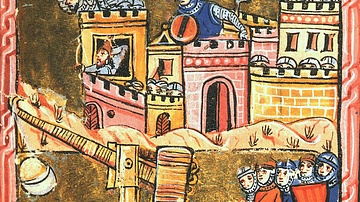Search
Did you mean: Frederick II?
Search Results

Definition
Bleeding Kansas - Dress Rehearsal for the American Civil War
Bleeding Kansas' was a term coined by the New York Tribune in 1856, referring to the escalating hostilities in the Kansas Territory between pro-slavery activists and anti-slavery 'free staters' following the passage of the Kansas-Nebraska...

Definition
Harriet Jacobs
Harriet Jacobs (l. c. 1813-1897) was a former slave, abolitionist, and author of Incidents in the Life of a Slave Girl (1861), her autobiography, describing her life as a slave in North Carolina, her flight to freedom in the North, and her...

Definition
Charles Cornwallis
Charles Cornwallis (1738-1805), 1st Marquess and 2nd Earl Cornwallis, was a British military officer and statesman best known for surrendering to George Washington at the Siege of Yorktown, the final decisive engagement of the American Revolutionary...

Definition
Knights' Revolt
The Knight’s Revolt (1522-1523) was a military action led by the German imperial knight Franz von Sickingen (l. 1481-1523) and encouraged by the knight and writer Ulrich von Hutten (l. 1488-1523) launched to restore the status of the imperial...

Definition
Manuel I Komnenos
Manuel I Komnenos was emperor of the Byzantine Empire from 1143 to 1180 CE. Manuel continued the ambitious campaigns of his grandfather Alexios I and father John II to aggressively expand the boundaries of his empire. Manuel turned out to...

Definition
Henricus Colony of Virginia
Henricus (1611-1622, also known as Henrico, Henryco, Citie of Henryco) was a colony established in Virginia in 1611 by Sir Thomas Dale (l. c. 1560-1619). Dale had been ordered by the Virginia Company of London – which had funded the establishment...

Article
The Mongol Invasion of Europe
The Mongol invasions of Russia and Eastern Europe occurred first with a brief sortie in 1223 CE and then again in a much larger campaign between 1237 CE and 1242 CE. The Mongols, seemingly coming from nowhere and quickly gaining a reputation...

Article
The Siege of Acre, 1189-91 CE
The Siege of Acre, located on the northern coast of Israel, was the first major battle of the Third Crusade (1189-1192 CE). The protracted siege by a mixed force of European armies against the Muslim garrison and nearby army of Saladin, the...

Definition
Saladin
Saladin (1137-93) was the Muslim Sultan of Egypt and Syria (r. 1174-1193) who shocked the western world by defeating an army of the Christian Crusader states at the Battle of Hattin and then capturing Jerusalem in 1187. Saladin all but destroyed...

Definition
Underground Railroad - Pathways to Freedom
The Underground Railroad was a decentralized network of White abolitionists, free Blacks, former slaves, Mexicans, Native Americans, and others opposing slavery in the United States who established secret routes and havens to help slaves...